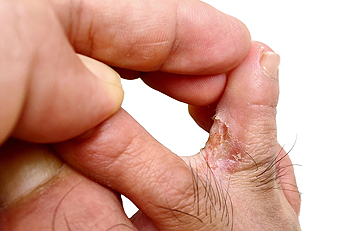
Tinea pedis, more commonly known as athlete’s foot, is a foot infection caused by fungus. Athlete’s commonly get this infection because it thrives on warm, damp surfaces like pools, locker rooms, and public showers where athletes are and may walk barefoot, hence Its name athlete’s foot. Children rarely get athlete’s foot, but teens and anyone with sweaty or damp feet are at risk for the infection. This condition can get uncomfortable and present itself as bumps on the feet, cracked, blistered and peeling areas that are often between toes, redness, and scaling on the soles of the feet. Other possible symptoms are cheesy skin between toes that has an unpleasant odor or a rash that spreads to the inside of the foot. It is highly contagious and can be spread to other body parts or other people. To prevent this infection, keep feet as clean and dry as possible, air feet out by not wearing the same shoes all the time, wear foot coverings in public areas, and do not share towels or footwear. If you suspect you have athlete’s foot, a visit to a podiatrist to provide treatment and to prevent it from spreading is highly suggested.
Athlete’s Foot
Athlete’s foot is often an uncomfortable condition to experience. Thankfully, podiatrists specialize in treating athlete’s foot and offer the best treatment options. If you have any questions about athlete’s foot, consult with Dr. Tupper from Coshocton Foot Health Center. Our doctor will assess your condition and provide you with quality treatment.
What Is Athlete’s Foot?
Tinea pedis, more commonly known as athlete’s foot, is a non-serious and common fungal infection of the foot. Athlete’s foot is contagious and can be contracted by touching someone who has it or infected surfaces. The most common places contaminated by it are public showers, locker rooms, and swimming pools. Once contracted, it grows on feet that are left inside moist, dark, and warm shoes and socks.
Prevention
The most effective ways to prevent athlete’s foot include:
- Thoroughly washing and drying feet
- Avoid going barefoot in locker rooms and public showers
- Using shower shoes in public showers
- Wearing socks that allow the feet to breathe
- Changing socks and shoes frequently if you sweat a lot
Symptoms
Athlete’s foot initially occurs as a rash between the toes. However, if left undiagnosed, it can spread to the sides and bottom of the feet, toenails, and if touched by hand, the hands themselves. Symptoms include:
- Redness
- Burning
- Itching
- Scaly and peeling skin
Diagnosis and Treatment
Diagnosis is quick and easy. Skin samples will be taken and either viewed under a microscope or sent to a lab for testing. Sometimes, a podiatrist can diagnose it based on simply looking at it. Once confirmed, treatment options include oral and topical antifungal medications.
If you have any questions, please feel free to contact our office located in Coshocton, OH . We offer the newest diagnostic and treatment technologies for all your foot care needs.
